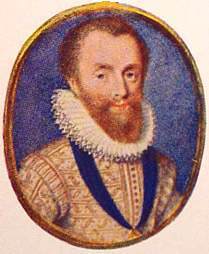Elizabeth and Essex
Robert Devereux, Earl of Essex, was the Queen's favourite during her declining years; but his excessive popularity and his blatant attempts to misuse royal patronage brought an inevitable fall from grace. He was executed after leading an unsuccessful rebellion.
Devereux's charisma, generosity and skill as a military commander won him great popularity*, particularly among soldiers; among his admirers were Shakespeare's patron, the Earl of Southampton*, and Francis Bacon. But Essex was also proud and arrogant*; he failed miserably in his attempts to win appointments for friends because Elizabeth correctly distrusted his motives.
Shakespeare and Essex
Essex's ambitions also destroyed the precarious balance of Elizabeth's earlier reign by forcing her to side with a single faction, led by Robert Cecil, Secretary of the Privy Council. After a failed campaign to put down rebellion in Ireland, Essex abandoned his post and returned to court without the Queen's permission.
A combination of mounting debts, lost credibility, and desperate ambition led to plans for a rebellion together with other nobles and gentry envious of Cecil's faction. Prior to their uprising they arranged a performance of Shakespeare's Richard II* (about the deposition of a monarch governed by evil advisors), which understandably alarmed the Queen and her councillors. (Elizabeth was outraged and reportedly remarked to her Lord Keeper, "I am Richard II. Know ye not that?") But when Essex marched on London with 200 armed followers he received no popular support and was easily arrested.
Footnotes
-
Rival icons
The war with Spain raised Essex and a few other nobles to the dangerous status of popular heroes, rivalling Elizabeth as cult figures; in 1600 this led the Privy Council to forbid engravings of nobles from being produced for public sale.
-
Keeping his head
Southampton and most other conspirators in the 1601 rebellion were spared execution. (More on Shakespeare's association with Southampton.)
-
The arrogance of Essex
In one incident his rude behaviour to the Queen, turning his back on her, caused Elizabeth to slap him in the face; he then moved for his sword and had to be forcibly taken from the room by his followers to save him from the Queen's wrath.
He also infuriated her when he married (without her permission) Sir Philip Sidney's widow.
-
A warm-up for the real thing
The company was paid 40 shillings more than the usual amount for the performance (apparently they complained that it was so "old and so long out of use" that there would be few in the audience). Augustine Phillips, one of the players, had to go before the Privy Council to explain their involvement, but no action was taken against them.
When the play was first published, the whole deposition scene was censored.
-
Essex and Henry V
In Henry V, Shakespeare specifically alludes to Essex's expedition to Ireland, and the high hopes the English had of him. The number of people welcoming Henry is likened to the number that would greet a victorious Essex:
"Were now the general of our gracious empress
(As in good time he may) from Ireland coming,
Bringing rebellion broachèd on his sword,
How many would the peacful city quit
To welcome him!"
(5. Chorus 30-34)
